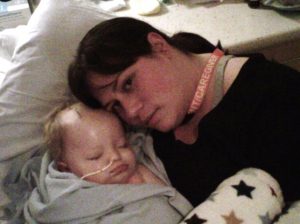 In recognition of National Child Abuse Prevention Month, On the Pulse shares a heart-wrenching story about a mother whose son suffered debilitating injuries at the hands of a babysitter. Through the pain and daily struggle of caring for a fully disabled child, she has become a driving force for advocacy and awareness for child abuse prevention.
In recognition of National Child Abuse Prevention Month, On the Pulse shares a heart-wrenching story about a mother whose son suffered debilitating injuries at the hands of a babysitter. Through the pain and daily struggle of caring for a fully disabled child, she has become a driving force for advocacy and awareness for child abuse prevention.
What began as a normal day for Jamie Thompson, ended in a tragedy that would forever change her life.
On May 20, 2010, Thompson received an unexpected call at work. It was her 8-month-old son’s babysitter.
“I was told he wasn’t breathing and paramedics had arrived to the babysitter’s home to help resuscitate him,” said Thompson. “As I frantically left work, I received a second call — this time from my husband.”
With news from her husband that her son, Colby, was not responding, Jamie drove straight to Seattle Children’s where he was urgently transported to by helicopter.
 When Thompson arrived, she was both devastated and confused by the sight of Colby’s condition.
When Thompson arrived, she was both devastated and confused by the sight of Colby’s condition.
“He had a neck brace and was intubated,” said Thompson. “Nobody had answers at that point until doctors ran several tests on him.”
The following day, doctors at Seattle Children’s were able to collect enough information from the tests to determine the cause of Colby’s condition.
“We sat down with a doctor who told us that his injuries were inflicted by someone,” said Thompson. “We were then told he had severe swelling and bleeding in his brain and most likely wouldn’t survive.”
The painful days that followed
 Thompson spent a total of 42 days at Seattle Children’s as Colby received treatment.
Thompson spent a total of 42 days at Seattle Children’s as Colby received treatment.
When he was stable enough to leave the hospital, Thompson brought home a son who was almost unrecognizable from the happy and healthy baby boy she left at her babysitter’s home just a month and a half ago.
Thompson left her job to fully focus her time on caring for Colby, the youngest of her six children.
“Because of the brain damage and retinal hemorrhaging he suffered, Colby became blind, developed partial hearing loss, cerebral palsy and has to be fed through a tube among other serious medical issues,” said Thompson. “He sadly doesn’t have the physical or mental ability to function on his own.”
Colby requires around-the-clock care. He is on 13 different medications, some of which need to be administered every three hours.
“It’s a difficult and labor intensive job, but Colby is everything to me and it’s my responsibility as a mother to care for him the best I possibly can,” said Thompson.
Justice and advocacy in the midst of tragedy
As time went by, the investigation into Colby’s debilitating injuries reached its final stages.
“It was confirmed that it was the babysitter who had deliberately caused the injuries,” said Thompson. “It was a heart-wrenching feeling.”
The babysitter pleaded guilty and was sentenced to 10 years in prison — the maximum time a person can receive for committing this type of crime.
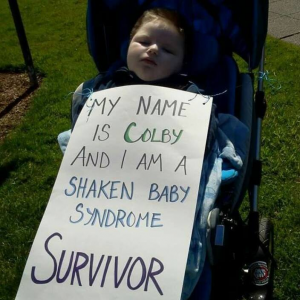 As Thompson worked to move forward from this tragedy, she started by searching for ways to get involved in making crucial changes to legislation involving child abuse.
As Thompson worked to move forward from this tragedy, she started by searching for ways to get involved in making crucial changes to legislation involving child abuse.
“I learned there were many gray areas in laws regarding childcare,” said Thompson. “I asked myself — what can we change and what can we do?”
At the same time, Thompson looked into the history of child abuse, reading about how and where it generally happens. A common theme in the information she gathered was the lack of basic childcare education in situations where abuse had occurred by a caregiver.
“This is what drove my advocacy work,” said Thompson. “My goal is to get people who work in childcare educated, trained and licensed so they know how to properly care for a child. It’s extremely important that people know how to safely handle challenging situations with a child.”
Thompson’s work led to a piece of legislation that was passed in 2011 called the Colby Thompson Act, which heightens the civil penalty for specific home childcare violations. It also increases the transparency of licensed and unlicensed childcare to the public. These measures are closely monitored by Washington state’s Department of Early Learning.
Thompson and her family were overjoyed when the act was passed.
“It was one more way to try to bring awareness to a topic that many are uncomfortable talking about,” said Thompson. “Child abuse is an important issue which deserves to be discussed and dealt with.”
Platforms for prevention
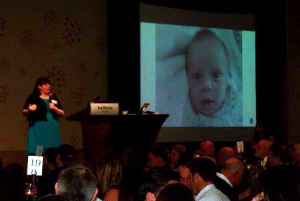 Thompson has made it her mission to provide a voice to child abuse awareness and prevention.
Thompson has made it her mission to provide a voice to child abuse awareness and prevention.
“It’s inspiring that Jamie openly shares Colby’s story to help shed light on the often taboo subject of child abuse,” said Christine Baker, program coordinator for the Period of PURPLE Crying, an education program promoted by Seattle Children’s Protection, Advocacy and Outreach Program.
Seattle Children’s leads a statewide effort through the Abusive Head Trauma (AHT) Prevention Coalition of Washington to help prevent abusive head trauma cases like Colby’s. One of these efforts is called the Period of PURPLE Crying, a video-based parent education program that helps new parents learn how to safely care for their baby during periods of extended crying and other highly stressful times.
Tips shared with parents who may find themselves frustrated due to their baby’s crying include putting your baby down in a safe place and walk away to take a few minutes to calm down, reaching out to a trusted friend or family member for support, and no matter what, try to stay calm and never shake your baby.
To help fund these efforts, members of the University of Washington’s Kappa Delta sorority host an annual auction event which benefits the AHT Prevention Coalition of Washington.
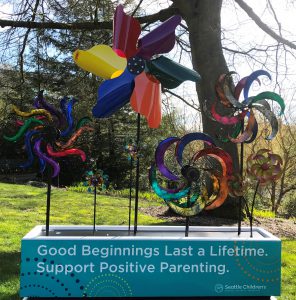 “Although Jamie is very busy taking care of her medically complex son, she graciously finds time to participate and speak at the annual Reach for the Sky Auction, which she has done every April for the past few years,” adds Baker. “We are deeply grateful for the opportunity to know and work with Jamie and the rest of the Thompson family.”
“Although Jamie is very busy taking care of her medically complex son, she graciously finds time to participate and speak at the annual Reach for the Sky Auction, which she has done every April for the past few years,” adds Baker. “We are deeply grateful for the opportunity to know and work with Jamie and the rest of the Thompson family.”
Among the ongoing efforts from people like Thompson and the Kappa Delta sorority, Seattle Children’s is providing a visual reminder of the role the community plays in preventing child abuse to its hospital visitors this month.
A colorful and vibrant display of pinwheels created by design company Dillon Works can be found near the hospital’s main entrance. The six pinwheels varying in size and shape sit in a planter box with a slogan on the outside reading, “Good beginnings last a lifetime. Support positive parenting.”
Anne Granderson, who led the pinwheel project and program manager of Positive Parenting, another initiative of Seattle Children’s Protection, Advocacy and Outreach Program, said, “I believe that increased knowledge of child development and parenting strategies strengthen all families and can help prevent child abuse. It’s about building skills to cope with the stress and challenges that come with caring for a child and knowing that it’s never okay to hurt a child.”
A life forever changed
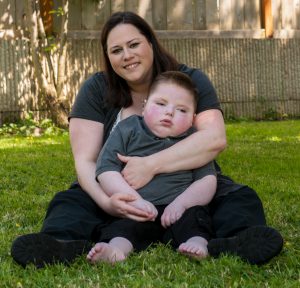 Thompson will never forget the agonizing day that forever changed the course of Colby’s life.
Thompson will never forget the agonizing day that forever changed the course of Colby’s life.
“I distinctly remember what Colby was like before it happened,” said Thompson. “To me, he was the epitome of sweetness — those chubby cheeks, blue eyes and bouncy little legs — who knew those things would disappear after that day.”
Thompson wants her story to be heard so parents and childcare providers will be encouraged to make positive choices while caring for children.
“Children don’t come with instruction manuals, which can be frustrating if a difficult situation happens,” said Thompson. “That’s why it’s important to openly discuss the issue of child abuse and what we as a community can do to help prevent it.”
Thompson continues to hold hope for Colby.
“Even though he can’t communicate through words, he can still express happiness through smiling,” said Thompson. “It’s a simple reminder that he is and always will be my sweet Colby.”

